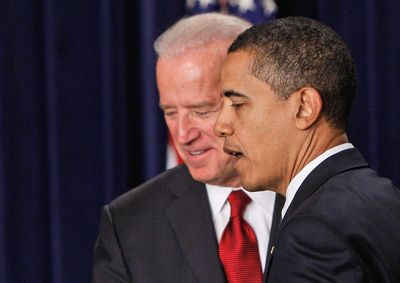Obama retakes oath of office
President also talks with military staff

WASHINGTON – In his first full day in the White House, Barack Obama pushed his top military advisers for a plan to withdraw combat troops from Iraq, and in an extraordinary exercise, took the oath of office a second time over concern about a miscue during his swearing-in.
Obama retook the oath before a few aides in the White House Map Room – 31 hours after he spoke the words on the West Front of the Capitol before about a million people arrayed on the Mall. In the first go-round, Chief Justice John Roberts botched the wording, deviating from the language in the Constitution. Following along, Obama repeated the mistake.
“Out of an abundance of caution,” White House Counsel Greg Craig said in a statement, Obama decided to retake the oath at 7:35 p.m. Wednesday. Roberts again presided.
In any case, Obama proceeded Wednesday in true presidential style, mixing international diplomacy, ceremonial events and bureaucratic action. The 44th president arrived at the Oval Office at 8:35 a.m., following a late night dancing at the inaugural balls. He spent 10 minutes alone, reading the private note left to him by his predecessor in an envelope marked “To: 44, From: 43.” But that was about the only quiet moment he got.
Tracking a campaign promise, the president spent part of the afternoon in a meeting with top military commanders running the war in Iraq. In a statement released afterward, Obama said he asked them to “engage in additional planning necessary to execute a responsible military drawdown from Iraq.”
On the campaign stump, Obama often pledged that on his first day as president he would call such a meeting. But then his language was more forceful. He typically said he would instruct the Pentagon it had a “new mission in Iraq”: Ending the war and bringing all combat forces home within 16 months.
Officials briefed on the meeting afterward said Obama’s goal remains the same – accelerating the troop withdrawal from Iraq. The discussion was amicable, with the president gently prodding the military to beef up planning for a quicker drawdown than they might have preferred.
Obama and military leaders are not far apart in their respective timetables. Obama has called for a withdrawal of all combat forces by mid-2010. Gen. Ray Odierno, the top U.S. commander in Iraq, has crafted a plan for a more conservative drawdown, but one that would still remove most forces well before the end of 2011. In the new status of forces agreement, the U.S. has pledged to remove all military forces from Iraq in three years time.
Obama was also focused on another war.
During the transition, Obama steadfastly refused to offer an opinion on the Israeli conflict in Gaza, noting there was only “one president at a time.” On his first day, Gaza was very much on his mind. He placed calls to the leaders of Israel, Egypt, Jordan and the Palestinian Authority to discuss Gaza and ways of making the cease-fire endure. He told them he wanted to stop weapons from being smuggled to Hamas as a step toward a permanent end to the fighting, according to the White House.
Obama also used Day One to signal his commitment to a central campaign promise: Upending the way Washington does business. He announced tough new restrictions on lobbying activity, while pledging to make government more transparent.
In a nod to the recession, he also said that the 100-some administration aides earning more than $100,000 would have to forgo pay raises.
Speaking to his senior staff, Obama said, “However long we are keepers of the public trust we should never forget that we are here as public servants and public service is a privilege. It’s not about advantaging yourself. It’s not about advancing your friends or your corporate clients. It’s not about advancing an ideological agenda or the special interests of any organization. Public service is, simply and absolutely, about advancing the interests of Americans.”
As a condition for working for the Obama administration, his appointees must sign a pledge meant to disrupt the “revolving door” by which lobbyists flow seamlessly into government, and back into the lobbying business.
His aides are barred from lobbying any executive agency for the life of the Obama administration. That means an appointee who leaves the White House in, say, 2010, would be barred from lobbying the executive branch until 2017, if Obama were to serve two terms.
At present, officials who leave an agency or department can’t go back and lobby their old offices for a period of at least one year.
“It’s unprecedented,” said Fred Wertheimer, president of the nonpartisan watchdog group Democracy 21. “It basically protects citizens against individuals entering public service and then converting their public service to personal financial gain when they leave.”
Lobbyists joining his administration must wait two years before they can take part in any issue on which they lobbied.